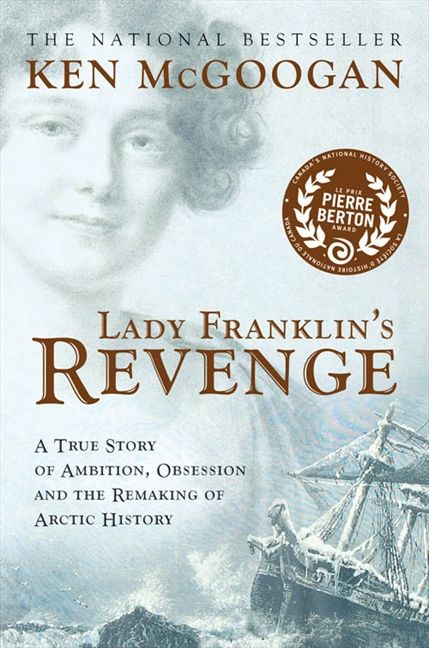Lady Franklin’s Revenge
 Buy the Book: Amazon, Indigo
Buy the Book: Amazon, IndigoTitle: Lady Franklin's Revenge: A True Story of Ambition, Obsession and the Remaking of Arctic History
Published by: HarperCollins Canada, Bantam/Transworld U.K.
Release Date: 2005
Overview
(This book won the University of British Columbia Medal for Canadian History. Soon afterwards, Ken received the Pierre Berton Award for History)
Lady Franklin’s Revenge tells the story of a remarkable British woman who, denied a constructive role by the male-dominated society into which she was born, took her revenge in mid-life by seizing control of that most masculine of enterprises, Arctic exploration, and shaping its history to her own ends. Born into a world that decreed her place to be in the home, Jane Franklin (1791-1875) rebelled without ever declaring it. Arguably the greatest woman traveler of the age, she rode a donkey into Nazareth, sailed a rat-infested boat up the Nile River, and beat her way through the Tasmanian bush. She rode elephants in Rajasthan, scrambled up volcanoes in Hawaii, and, at age seventy, circumnavigated the globe in steamers and rough sailing ships.
When her husband, Sir John Franklin, disappeared into the Arctic in 1845 while searching for the Northwest Passage, the dauntless Jane launched an unprecedented, twelve-year search. She raised funds, organized expeditions, stipulated routes, appointed captains, and dispatched ships, so contributing more to the discovery and mapping of northern North America than any other individual. Having failed to rescue the ill-fated Franklin, Jane worked through powerful male surrogates – among them Charles Dickens, Benjamin Disraeli, and the American magnate Henry Grinnell – to eradicate inconvenient truths, create a legend of her hapless husband, and change the course of Arctic history.
Praise
“an exhaustive and scrupulously researched biography”
—Sara Wheeler, The Times of London
“. . . belongs on the shelf next to such Arctic classics as Pierre Berton’s The Arctic Grail . . . this is an unforgettable book.”
—The Edmonton Journal
“an extraordinarily gripping book, and the best portrait we have had to date of the life of a woman who, whatever her faults, was by far the most compelling and durable figure in the great age of Arctic exploration.”
—Arctic Book Review
Question and Answer about Lady Franklin’s Revenge with publisher Phyllis Bruce
1. How did you become interested in Jane Lady Franklin?
In autumn 1998, while working on my book Fatal Passage in Cambridge, England, I began wondering why Arctic explorer John Rae had failed to receive the recognition he deserved. After all, Rae had discovered both the final link in the Northwest Passage and the fate of the lost expedition of Sir John Franklin. As I sifted through letters and documents at the Scott Polar Research Institute and consulted old newspapers at the Cambridge University Library, I discovered that Charles Dickens had crucially undermined Rae’s reputation by writing and publishing two articles in Household Words – and that he had done so at the behest of Jane Franklin.
The erasure from history of John Rae, the injustice of it, disturbed me enough that in Fatal Passage, I portrayed Jane Franklin as essentially villainous. My outrage did not quickly dissipate, and it must have surfaced when I spoke of the book, because again and again, after giving a public reading, I found myself answering questions about Jane Franklin. Who was this powerful woman? And how, precisely, did she bring about such a change in the historical record?
Even so, I didn’t seriously consider writing a book about Jane until the autumn of 2002, when I was living in Dawson City, Yukon. As writer-in-residence at Berton House, I gave a reading from Fatal Passage. Afterwards, as I signed a few books, a visiting playwright told me: “You feel so strongly about Jane Franklin that you really should write a book about her.” I muttered noncommittally, but she insisted: “No, no, really: think about it.” When I arrived home that night, I sat down to scribble a few notes . . . and discovered that I’d opened a floodgate.
Ken Responds to a Review with a letter to the Editor
In her perceptive and engaged but opinionated review ("Heroine or Hellcat?", December 2005), Wendy McElroy hails my latest book, Lady Franklin's Revenge, as brilliant and superbly written. She also declares the work "infuriating," charging that I show far too much generosity to the deplorable Jane Franklin.
McElroy wonders whether I have changed my mind about the contribution to Arctic exploration of the peerless John Rae, the subject of my book Fatal Passage. The answer is emphatically no. But my understanding of Lady Franklin, and particularly of her situation as a Victorian woman, deepened as I scoured archives and visited relevant sites, and that's why this biography, in McElroy's words, "exquisitely captures the complexity of Jane Franklin."